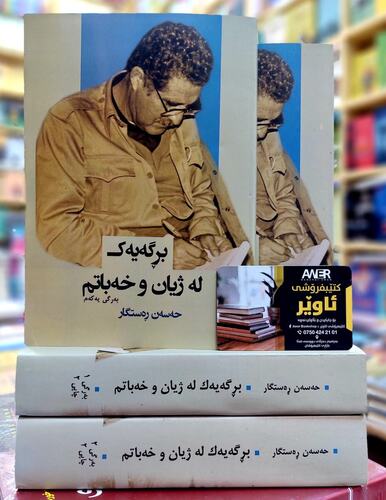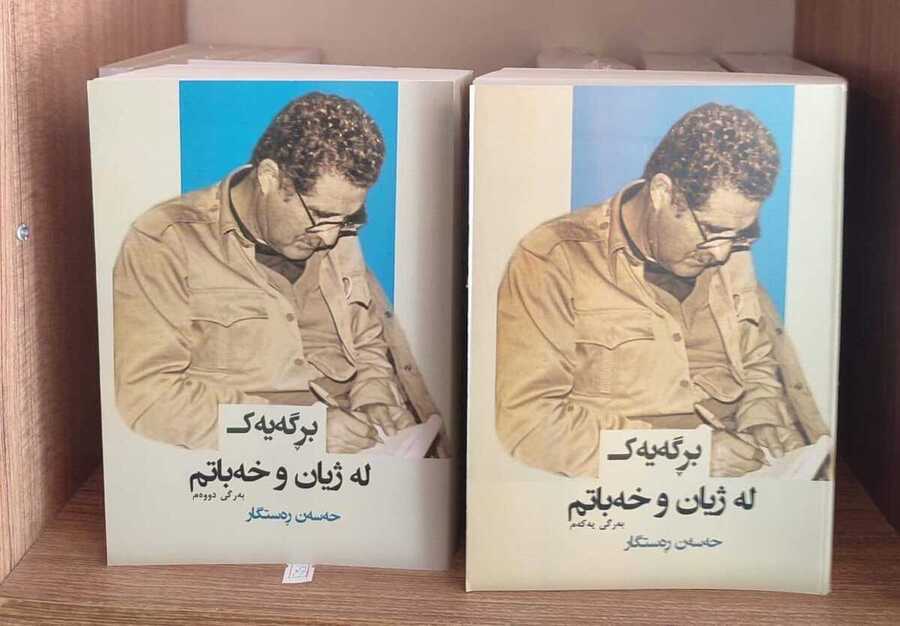Mullah Hassan Rastgar was a politician, writer, and revolutionist in the eastern part of Kurdistan. Almost ninety years ago, he was born in Mahabad, the eastern part of Kurdistan. He was born in a middle-class family of the Kurdish society in the East part of Kurdistan. His family had relationships with most of the other people of the society from different social classes since he was a kid, and because he lived in Mahabad, he could officially attend school eighty years ago and had a modern education. In fact, Mullah Hassan Rastgar was not a Mullah (a religious leader or priest) as he mentions this in his memoir, and this title was chosen for him and his cousin, Mullah Rasoul Pishnamaz. They never attended religious schools but rather a modern school in the town. Mullah Hassan continued his education until he received his diploma which was considered to be a high degree seventy years ago.
As it is comprehensible in his memoir, he was aware of the active political movements in Mahabad from a very young age. Mahabad at that time was a strong center and the main headquarters of national ideology in the East part of Kurdistan.
Hassan Rastgar's memoir clears out this fact of how well the Barzanis were received when they came to Mahabad in the East part of Kurdistan 76 years ago. How the people of Mahabad and other cities in Mukeryan region embraced them and proved that they would not leave their brothers and sisters who were separated from them by those artificial borders.
In addition to this, there is another strange and curious phenomenon, that is, the people of the East part of Kurdistan who were ordinary citizens became those migrated Barzanis' supporters and helped them settle in their towns and cities and they also helped out the political figures of the Barzanis to find a position in the East part of Kurdistan's political institutions while consulting them on such issues and gave them ranks. The most significant example of such an action was Mullah Mustafa Barzani's participation as the first General of Kurdistan Republic in Mahabad.
Mullah Hassan Rastgar also narrated that as little kids at that time, they were aware of the position of Mullah Mustafa Barzani himself and his efforts in coaching the young Peshmergas to learn how to use guns and pistols. They witnessed this responsibility that they chose to take to protect their brothers' dignity.
Such scenes and memories remain in Hassan Rastgar and his peers' memory so that as they grow older, they join the political institutions themselves. According to what Mullah Hassan Rastgar had written in his memoir, we find out that he began to contact the political activists of Mahabad from his youth and began to work for the Democratic Party of Kurdistan of Iran. He had great responsibilities in that party but during the 1950s many young political activists from Mahabad or other Kurdish cities and he got arrested by the infamous and inhumane system of SAVAK.

A long list of names can be prepared if all those whom Hassan Rastgar mentions who were arrested with him or a short while before him are included, however, some of them are Ismael Ghasemlou, Dr. Ali Mawlawi, Ghani Blouriyan, Mohammad Mawloud, and many others.
What is aimed to be emphasized here is not the rest of Hassan Rastgar's memoir, but rather a small point in that memoir that is the way the spying system of Mohammad Reza Shah Pahlavi treated the political, cultural, and social activists.
This is done for two reasons; first, Mullah Hassan Rastgar is still alive and it is possible to interview him about this subject, and second, for those Kurdish political activists who are working these days to know how to treat the monarchists' fans and members.
The Kurdish political activists in the Kurdish society in the East part of Kurdistan have been divided into two groups. After the Jin, Jiyan, Azadi (Woman, Life, Freedom) revolution began, a part of these activists joined the monarchists who were led by Reza Pahlavi, son of Mohammad Reza Shah Pahlavi, who followed his father's political attitudes. And the other group joined the left and democratic parties.
What is retailed in Hassan Rastgar's memoir about the SAVAK system is one of the most dangerous and inhumane systems that does not grant any kind of human rights to political prisoners. Rastgar talks about some very brutal and cruel tortures that he had to suffer from done by the SAVAK investigators. From whipping to being hanged from the ceiling, beating up severely to very harsh forms of torturing one prisoner by several men in such a way that he could not move several days after these events.
All those prisoners who were kept in Shah's prisons had to face such suffering done against them by SAVAK criminals and their officers and the curious point is that Hassan Rastgar says that it was declared that only Shah himself could dissolve the prisoners' conviction but nobody could visit Shah.
On the other hand, Hassan Rastgar narrates something else to prove the corruption in the inhumane system of SAVAK by saying that apparently after Reza Pahlavi who is trying to play the role of a liberal now, it was decided to shorten the time the prisoners had to be imprisoned. This means that not only there was now laws but also the Shah and his family's wishes were to be considered as law.
Hassan Rastgar talks about those who were executed. Those who lose all their life and dignity while waiting to be executed. This writer and politician also point out that even after a prisoner had finished all the time, they had spent in jail with all those tortures and insults and harassment, and after ten or twenty years of imprisonment, they were always being spied on by that system. This happened to Rastgar himself. He was never able to find a job as a teacher after his imprisonment because of his past.
Now, based on this memoir and all those experiences, how wise it is to follow and unite with that figure who is the heritage of such a cruel system. Mullah Hassan Rastgar has clearly shown the true face of the monarchy system.








